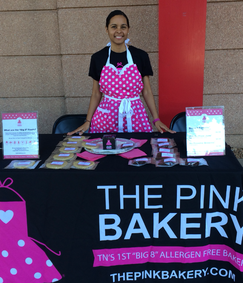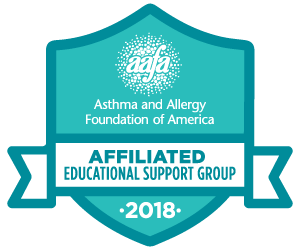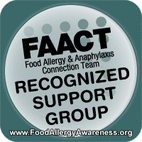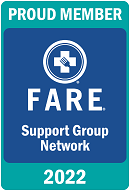|
Interview with Nubian Simmons  The following are my life experiences and my opinions. They are not intended to offend or offer medical advice. 1. What are you allergic to, and when were you diagnosed? I am allergic to milk (age 15) and wheat (age 34). I can remember being 6 or 7 and always at the doctor’s office getting tested. I do not know how prevalent food allergies were 30 years ago, but my mom, a retired nurse, was determined to figure it out. Once we realized it was the milk, she searched to find anything I could eat or drink that would not cause a reaction.  As far as the wheat goes, I had itchy, scaly eczema for as long as I could remember. I noticed rashes on my face that developed after eating a sandwich or other foods that contained wheat. My family members had it too. A few years ago, I stopped eating wheat products because the rashes happened more frequently. Not only did the rashes stop, but my eczema went away also. I went to a restaurant and ordered a seafood salad. I had what is called a first indicator response. The inside of my ear felt funny-it sounded like I had water in my ear. My throat became itchy, and it was getting very tough to breathe. My whole face broke out into scabby, painful hives. I treated the reaction according to my emergency care plan. The seafood salad used imitation crab meat, which is made from wheat starch. Had the company listed that it contained wheat, I would not have eaten it. I look back at the rashes I had when I was younger and realize I had sensitivity to wheat but never had such a violent reaction as I did when I ate the salad. 2. What did your parents do that helped you learn to manage your own allergies? My mom really tried to find substitutes for me. It was still tough because my siblings got to eat the “normal” foods. Her love and support meant everything. Even though she was not going through everything I was going through, just knowing she was there to support me meant the world to me. 3. What challenges do you face today as an adult with food allergies? A few challenges today as an adult are socializing and dating. Socializing: Every social invitation I receive involves some type of food. As accommodating as people try to be (and they really, really make considerable effort), it is tough to explain all the “also known as” foods, and how I do not buy things that have been “processed in a facility with,” or how they cannot place the foods close to any wheat or milk products on the table. If I do chance it, I always wear long sleeves and bring my own food. It is easier at times to not go because people do not understand the severity. Dating: In my experience, the person you are dating HAS to change their lifestyle to date you. I am talking about a complete elimination of those foods from their diet, because it is harmful for me. You are at the mercy of that person’s eating decisions. What if they truly forget? I am the wheat and milk police – “So what did you eat today? Did anyone bring doughnuts into the office? Did you have any milk in that coffee?” 4. What positive things have happened because of your food allergies? I have an acute awareness when it comes to understanding my body’s language. I have done research on food allergies and have learned the importance of nutrition and holistic healing. I learned how our food supply is processed. I have learned to be thankful for my allergies; they protect me from the “experiments” by the food industry. 5. What is the biggest piece of advice you have for anyone managing food allergies, regardless of age? Educate yourself. Listen to your body. YOU are the ONLY expert on your body. Read labels, and learn the “also known as” names of the foods you are allergic to, or how it was processed, and if there was any possibility of cross contamination. Become very diligent and disciplined. If you have a reaction to something, eliminate the food. I would also like to tell anyone managing food allergies, that there is NOTHING WRONG WITH YOU! I cannot stress this enough! Your body is not dysfunctional. You are not weird (or any other name people use to describe us). 6. You’ve been a member of FARE for years and became a member of FAAM as soon as you moved to Memphis. Why is being active in your food allergy community important to you? Being active is important for a number of reasons: Having food allergies is socially isolating, so being able to hangout with others who understand is invaluable; to find out what is going on in our community; and to learn about different recipes from others. Once you get this food allergy thing down, you can make some amazing dishes! 7. What motivated you to start The Pink Bakery? I was tired of being excluded from dessert. The box mixes were not to my standard in texture or taste. I learned how to bake with gluten free flours from scratch and without eggs and milk. Those three are the holy trinity in desserts. I learned about each ingredient’s structure and the role it played in the recipe. Five years into my research and development, I have three dessert options; six if you include the mixes. After a lot of research, feedback, and hard work, I am so proud of what I made. I am most proud of the fact that we – the food allergy community – no longer have to settle for subpar desserts. My desserts are made using only organic, non-GMO, gluten free, fair trade, and responsibly sourced ingredients. It was never a dream of mine to become a baker or have a bakery. The “need” in the community helped me decide to make this available to others. The Pink Bakery is Tennessee's first big 8 allergen free bakery. The “why” that pushes me is the thought of a parent of a child with food allergies whose birthday is coming up, and they are frantically trying to make a birthday cake, and they are unable to, or what they do make is not edible. That thought saddens me. 8. You state your products are free of the top 8 allergens; tell us more about what that means. The Pink Bakery’s desserts are free of the Big 8 food allergens: eggs, finfish, milk, peanuts, shellfish, soy, tree nuts, and wheat. They are baked and prepared in a dedicated kitchen free from those Big 8 foods. I understand cross contamination, and I am a Certified Professional Food Manager. We have been inspected by the State of Tennessee’s Department of Agriculture and passed with flying colors! I am only allergic to 2 of the Big 8 food allergens, but because I know what it feels like to be excluded, I eliminated those other six foods. They are naturally vegan. With my mixes, all you add are water and oil. 9. Where can we buy/order these delicious desserts? You have a few options when it comes to purchasing our desserts. I set up at several of our local farmer's markets throughout the year. Follow TPB on Facebook and Instagram to find us around town and try one of our dessert options: individual Mama’s Favorite® Chocolate, Chocolate Chip Cupcakes with White Chocolate Peppermint Frosting, individual Not So Plain Jane® Lemonade Frosted Sugar Cookies, and individual No Frownie Brownies®. Each of our treats are wrapped and sealed to prevent any cross contamination. You can also order online and contact us with special requests. About the Author: FAAM is thankful to have Nubian as an active member and excited that she shared her experiences as an adult with food allergies with us. The Pink Bakery is a family affair as Nubian and her siblings, who also have a huge heart for those with food allergies, bake together.
1 Comment
Rose Conway
6/21/2017 08:06:33 am
What a great educational article! I'm glad their are bakers that care so much and provide such quality healthy options.
Reply
Leave a Reply. |
Food for Thought is the blog for the Food Allergy Alliance of the Mid-South. FAAM's mission is to provide food allergy support, education, advocacy, fellowship & fun for Memphis, TN and surrounding areas.
Archives
August 2023
Categories
All
Terms of Use Disclaimer:
By using this site, you are agreeing to the terms of use stated. If you do not agree with these terms, please do not use this site. The content on this web site and any information presented by FAAM is for informational purposes only and NOT a substitute for medical advice, diagnosis or treatment. The authors are not offering individual medical advice; this material is for reference only. A physician or other qualifying medical professional should always be consulted for medical advice/diagnosis. The authors of this web site; anyone associated with FAAM as members, advocates, leaders, or advisors; Friends of FAAM and/or anyone involved with the production of this web site are not responsible, and do not assume responsibility for any loss, damage, injury, illness, death, or other negative impact that may occur after reading and using the information on this web site. If you have a medical emergency, call 911 immediately and follow up with a physician. |
Providing support, education, advocacy, & fellowship for the food allergy community of Memphis, TN and surrounding areas
P.O. Box 342907 | Memphis, Tennessee 38184-2907 | (901) 300-0790 | Email FAAM
FAAM is a 501(c)(3) nonprofit organization. Copyright © 2015-2024, Food Allergy Alliance of the MidSouth, All rights reserved.
FAAM is a 501(c)(3) nonprofit organization. Copyright © 2015-2024, Food Allergy Alliance of the MidSouth, All rights reserved.



